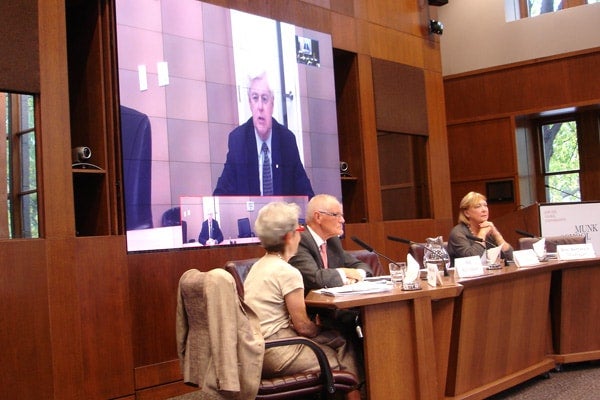
Ministering to the minister
Published: October 20, 2011
Frankness is a big key to a successful relationship between a cabinet minister and his or her deputy minister, according to those who should know: three former foreign ministers.
Bill Graham, Barbara MacDougall and John Manley may have diverse party affiliations, but they found a lot of common ground in discussing the job of foreign minister at an Oct. 13 University of Toronto conference. Diplomacy in the Digital Age was organized by the Munk School of Global Affairs in honour of Alan Gotlieb, Canada’s former ambassador to the United States, and offered students in the master’s of governmental affairs program insights into the realities of diplomatic life.
“My deputy minister, Reid Gordon, was a straight from the shoulder guy and I could always trust that I’d get an honest reaction,” said MacDougall, who served under former prime minister Brian Mulroney. “Maybe it wasn’t always right and maybe it wasn’t always what I wanted to hear, but he was very conscientious and served the prime minister well.”
Trust was important, said Graham, who served in foreign affairs under both Jean Chretien and Paul Martin, “and it took time to get it, like in any personal relationship.”
Manley, who served as foreign minister under former prime minister Jean Chretien, said honesty was crucial to a good working relationship, but as valuable was the sense the he and the deputy agreed upon medium- and long-term objectives.
“It’s very easy in political life to be distracted by daily occurrences,” Manley said. “It’s easy to forget that if you want to accomplish something you must build a series of steps over time.”
The trio also good relationships with the prime ministers they served and noted they were given lots of latitude to do their jobs.
“I had a great relationship with both prime ministers I worked for,” said Graham, who is currently chancellor of U of T’s Trinity College. “Mr. Chretien was hands off, but that didn’t mean I didn’t talk to him regularly.”
Manley agreed.
“He basically told you to go out and do your job and he’s let you know if he had any concerns about anything.”
MacDougall called Mulroney “the best boss I ever had, public or private sector.
“He didn’t interfere with your role, but if I wanted to call him I could.”
All three concurred that diplomacy has changed somewhat, given the instantaneous communication that’s possible and the flood of information available.
“You must have even better filters on the information coming to you,” Manley said, noting that digital media have had a profound effect on the democratic process. “We’re don’t have time any more. We need to obtain information, evaluate it and act on it, but we’re on fast forward.”
Graham noted that communications with the media are also trickier today.
“There’s stress and pressure put on you,” he said. “You’re called upon to respond when you don’t have time for reflection.”
Yet some things will always remain the same.
“You have to be more careful now of the potential for leaks,” said MacDougall, “but you still need boots on the ground and ways of communicating.”



